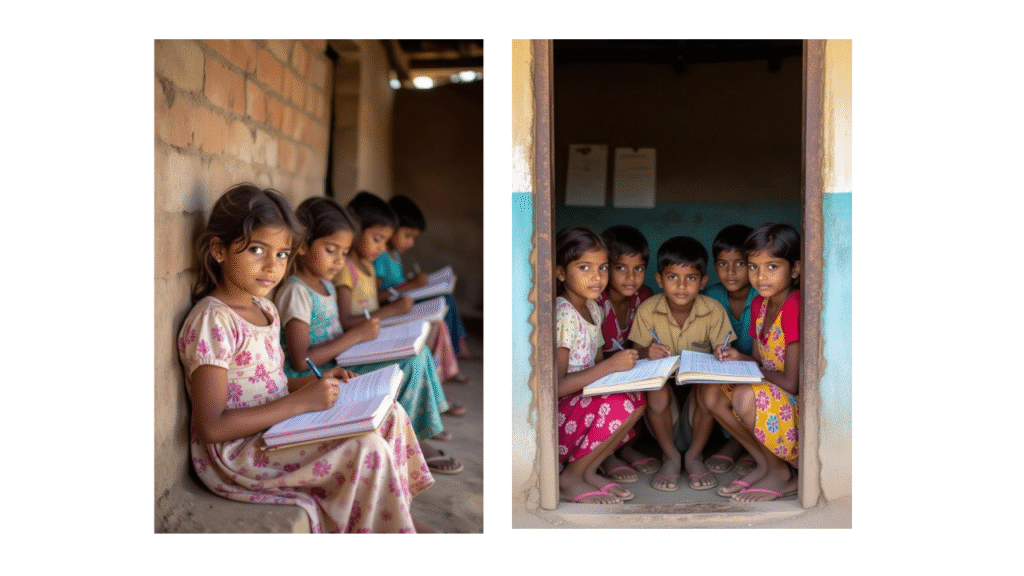Photo Credit: Parinita Mathur
Clear Cut Education Desk
New Delhi, UPDATED: Sep 01 2025 01:56 IST
Written By: Antara Mrinal and Janmojaya Barik
Educate Girls, a non-profit organization established in Rajasthan in 2007, has become the first Indian non-profit to receive Ramon Magsaysay Award. Educate Girls is one of the three recipients this year, a moment of pride for all of us. The other awardees are Flaviano Antonio L. Villanueva of the Philippines and Shaahina Ali of the Maldives. The 67th Ramon Magsaysay Award presentation will take place on November 7 at the Metropolitan Theatre in Manila. Each recipient will receive a medallion, a certificate, and a cash prize.
Over the decades, its laureates have ranged from social reformers to environmental crusaders. In 2025, Educate Girls has joined their ranks as a grassroot movement reshaping India’s educational landscape. For Educate Girls, receiving the Ramon Magsaysay 2025 award is more than just a trophy; it is evidence of a vision, moulded by empathy, planning, and a steadfast faith in the transformational potential of education. “Strongly aligned with the Right to Education Act, Samagra Shiksha, and the National Education Policy, Educate Girls is committed to the Government’s vision of improving access to quality education for all learners, especially girls and young women”, this continues to be the guiding vision of the NGO as it expands its reach to new regions. It represents communities defying gender conventions, women realizing their value, and leadership that dares to have bold dreams.
History of Ramon Magsaysay Award
The Ramon Magsaysay Award, often known as “Asia’s Nobel Prize”, is given out annually to honor the former Philippine President Ramon Magsaysay’s example of honourable leadership, valiant public service, and realistic idealism in a democracy. Established in 1957, the award celebrates people and organizations that exhibit unselfish devotion and transforming influence across Asia. The trustees of Rockefeller Brothers Fund, in collaboration with the Philippine government, recognized this award after Ramon Magsaysay’s sudden death in a plane crash in 1957 shocked the nation. This award aims to recognize “greatness of spirit” that reflects Magsaysay’s own values.

Ramon Magsaysay medallion (left) and Ramon Magsaysay (1907-1957), the former president of the Philippines (right). (Image Source : Wikipedia)
Since its inauguration, the award has been conferred on over 300 laureates from more than 20 Asian countries. As of August 2025, 60 Indians have received the award including Mother Teresa (1962) for her work with the poor in Kolkata, Jayaprakash Narayan (1965) for public service, Satyajit Ray (1967) for journalism, literature and creative communication art, Ela Bhatt (1977) for empowering self-employed women in India, Kiran Bedi (1994) for prison reforms, Aruna Roy (2000) for the Right to Information movement in Inida, Arvind Kejriwal (2006) for emergent leadership, Sonam Wangchuk (2018) for reforming education in Ladakh, Ravish Kumar (2019) for journalism. And now, in 2025, Educate Girls led by Safeena Husain (Founder and Board Member at Educate Girls) and Gayatri Nair Lobo (Cheif Executive Officer at Educate Girls).
The Ramon Magsaysay Award Foundation announcing the award for Educate Girls remarked : “An Indian organization whose groundbreaking work in addressing gender injustice in education in India’s most rural and remote areas creates a ripple effect that uplifts families, communities, and entire societies.”
About Educate Girls NGO
What began in Rajasthan in 2007 as a modest pilot spanning 50 village schools has now blossomed into a nationwide force, enrolling over 2 million girls across 30,000 villages and providing remedial for more than 2.4 million children. The organization thrives through initiatives like Vidya (nurturing enrolment for girls upto age 14) and Pragati (offering adolescent girls and young women between 15-19 years of age a second chance at education and employability).

From left: Safeena Husain (Founder and Board Member at Educate Girls) | Image source: LinkedIn and Gayatri Nair Lobo (Chief Executive Officer at Educate Girls) | Image source: The Economic Times
At the heart of this foundation is Safeena Husain, the first Indian woman to be honoured with the WISE Prize for her contributions to girls’ education in rural India. She has also received the NITI Aayog Women Transforming India Award and international recognition, including the USAID Millennium Alliance Award, MIT Solve’s Learning for Girls & Women Challenge, the Skoll Award for Social Entrepreneurship, and the World Bank India Development Marketplace Award. Safeena is also an alumna of the London School of Economics (LSE) who returned from San Francisco in 2005 and launched Educate Girls to confront illiteracy among marginalized girls. Under her leadership, Educate Girls launched the world’s first Development Impact Bond in education and earned global recognition as Asia’s first Audacious Project.
Reflecting on the award, she said: “Being the first Indian non-profit to receive the Ramon Magsaysay Award is a historic moment for Educate Girls and for the country. This recognition places a global spotlight on India’s people-powered movement for girls’ education, one that began with a single girl in the remotest village and grew to reshaped entire communities, challenging traditions and shifting mindsets.”
Earlier in 2025, Gayatri Nair Lobo took the helm as the Chief Executive Officer, bringing nearly 25 years of experience across strategy consulting and grassroots development. At the award announcement, she remarked : “At Educate Girls, we believe that education is one of the greatest levers for development. But above all, education is every girl’s fundamental and inherent right.” In a gesture acknowledging peers, she added : “Warm congratulations to our fellow awardees Shaahina Ali and Fr. Villanueva, whose work inspires us all.”
From its inception in remote Rajasthan classrooms to resonating across Asia, Educate Girls has shown that when one girl is educated, she takes others with her, weaving dreams into realities that ripple across homes, generations, and nations.
Turning Applause into Action
Educate Girl’s win isn’t just about recognition, it’s also a mirror held up to India’s development priorities. In India, NGOs working for the empowerment of girls and women face many challenges. They strive to address systemic inequalities, violence, and lack of access to resources. These organizations range from smaller groups to large national bodies that provide services, advocate for rights, and fill gaps in government programmes. However, many of them arise from financial constraints and limited public awareness. That an international award validated the NGO’s impact is a point of pride, but also a reminder that India must create stronger domestic ecosystems of recognition, funding, and collaboration for its NGOs. Homegrown changemakers shouldn’t have to wait for global platforms to validate their worth.

As we await the award ceremony and prepare to celebrate this recognition, it is equally important to reflect on the state of our NGOs and how each of us can contribute to their mission. If this win is to mean more than a ceremonial milestone, it must be followed by a systemic commitment: to uplift, empower, and enable NGOs as the lifeblood of India’s development.




